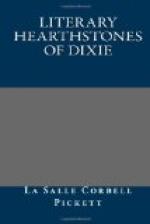* * * * *
The next winter Sidney Lanier was teaching in Prattville, Alabama, a town built on a quagmire by Daniel Pratt, of whom one of his negroes said his “Massa seemed dissatisfied with the way God had made the earth and he was always digging down the hills and filling up the hollows.” Prattville was a small manufacturing town, and Lanier was about as appropriately placed there as Arion would have been in a tin-shop, but he kept his humorous outlook on life, departing from his serenity so far as to make his only attempts at expressing in verse his political indignation, the results of which he did not regard as poetry, and they do not appear in the collection of his poems. His muse was better adapted to the harmonies than to the discords of life. Some lines written then furnish a graphic picture of conditions in the South at that time:
Young Trade is dead,
And swart Work sullen sits in the hillside fern
And folds his arms that find no bread to earn,
And bows his head.
In 1868, after Lanier’s marriage, he took up the practice of law in his father’s office in Macon. In that town he made his eloquent Confederate Memorial address, April 26, 1870.
Lanier, to whom “Home” meant all that was radiant and joyous in life, wrote to Paul Hamilton Hayne that he was “homeless as the ghost of Judas Iscariot.” He was thrust upon a wandering existence by the always unsuccessful attempt to find strength enough to do his work. At Brunswick he found the scene of his Marsh poems in “the length and the breadth and the sweep of the marshes of Glynn,” in which he reaches his depth of poetic feeling and his height of poetic expression.
From Lookout Mountain he wrote Hayne that at about midnight he had received his letter and poem, and had read the poem to some friends sitting on the porch, among them Mr. Jefferson Davis. From Alleghany Springs he wrote his wife that new strength and new serenity “continually flash from out the gorges, the mountains, and the streams into the heart and charge it as the lightnings charge the earth with subtle and heavenly fires.” Lanier’s soul belonged to music more than to any other form of art, and more than any other has he linked music with poetry and the ever-varying phenomena of Nature. Of a perfect day in Macon he wrote:
“If the year was an
orchestra, to-day would be the calm, passionate,
even, intense, quiet, full,
ineffable flute therein.”




